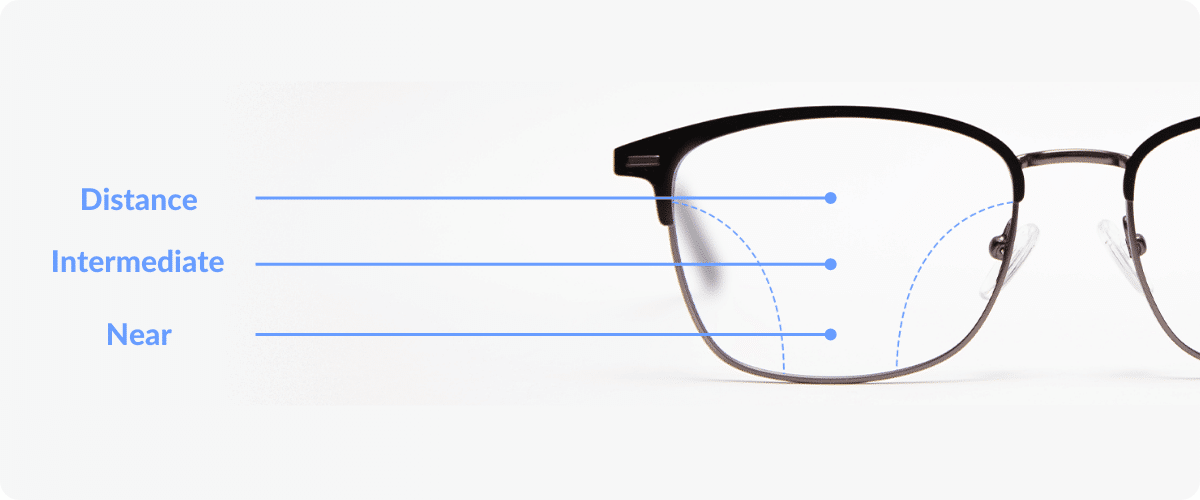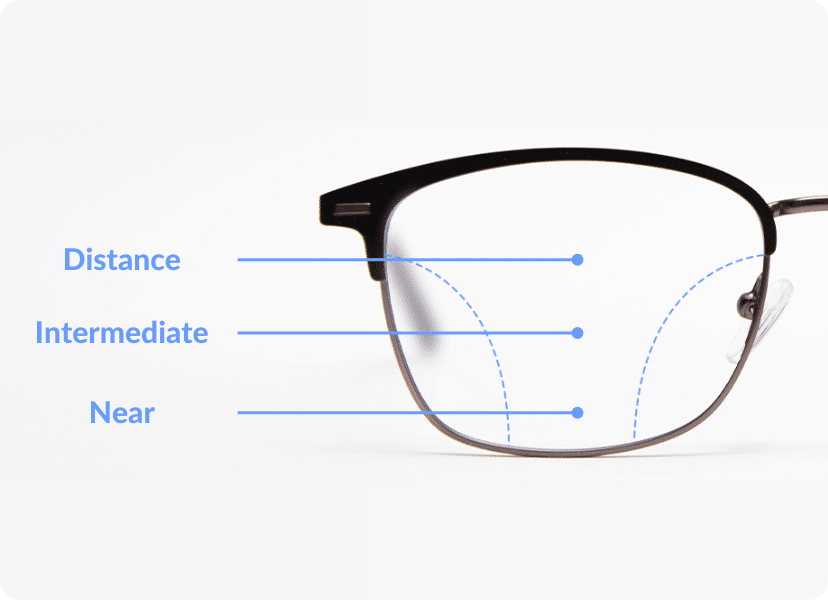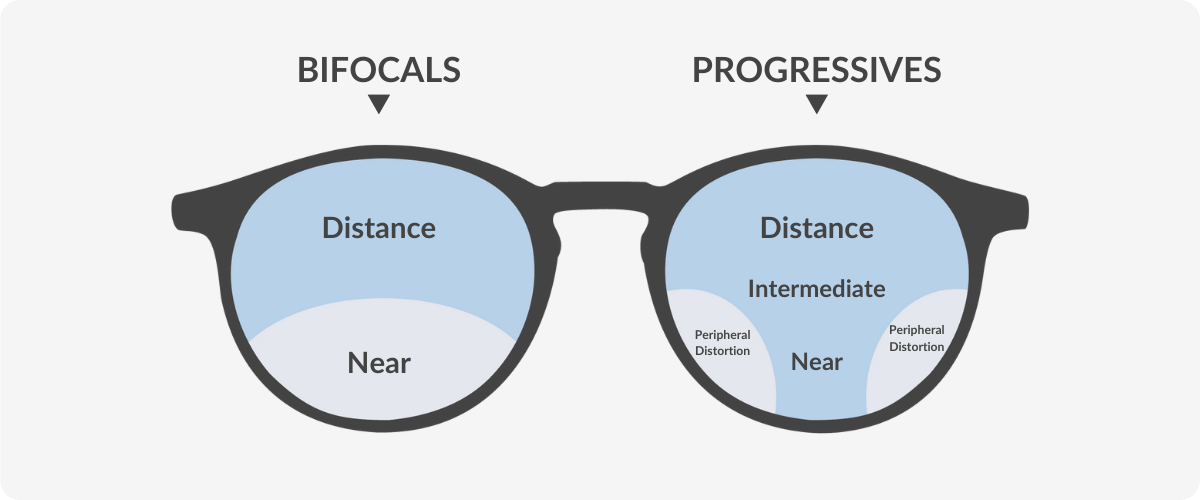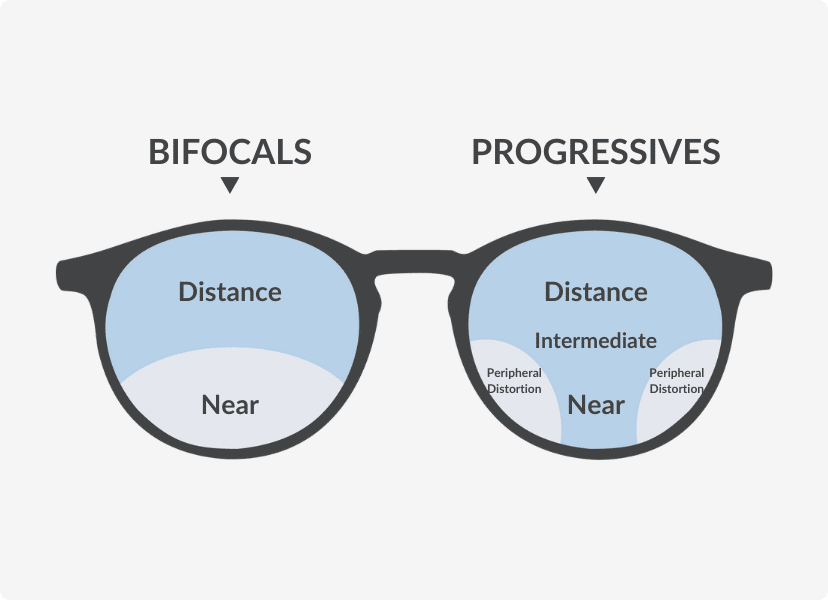Are Progressive Lenses Right for You?

Reviewed by
Maria Horan FBDO
Do you struggle to read your computer screen? Do the lines on your bifocals bother you? Are you tired of carrying around more than one pair of glasses?
When your vision needs to adapt to multiple distances, choose lenses that adapt with you. This guide will help you discover if progressive lenses are right for you.
What are progressive lenses?
Progressive lenses, also known as multifocal or varifocal lenses, combine three prescriptions in one pair of glasses.
This enables the wearer to perform close-up work (like reading), middle-distance work (like computer work) and distance viewing (like driving), without switching lenses.
These corrective lenses work by gradually increasing the lens magnification from top to bottom, eliminating the visible line of the lens.
The top portion of progressive lenses is for distance vision, the middle portion covers intermediate vision, and the bottom of the lens corrects close-up vision, e.g. reading


Are progressive lenses the same as bifocals?
No, progressive lenses are not the same as traditional bifocals. While bifocal lenses contain two distinct areas of vision correction separated by a visible line, progressives offer a smooth transition between near, intermediate, and distance vision.
By eliminating all visible lines, this type of lens provides a more natural visual experience compared to bifocals. Because of this, some find progressive glasses to be both more comfortable and more aesthetically pleasing.


DID YOU KNOW
In German, progressive lenses are called Gleitsichtgläser.
How do I know if progressive lenses are right for me?
To determine whether progressive lenses are suitable for you, you need to consider your vision needs and lifestyle. Usually, progressives are a good choice if:
- You have multiple optical prescriptions: Progressives offer a versatile solution that eliminates the need for multiple pairs of glasses.
- You experience discomfort with bifocals: If the visible lines or the image jump of bifocals are bothersome, a progressive lens can help by providing a smoother transition.
- You’re fed up with carrying and switching between glasses: It can prove cumbersome to carry several pairs of glasses. Wearing progressive lenses can condense several prescriptions into one pair.
If you wear bifocals, progressive lenses might be a good alternative for your eye health. Though progressive lenses cost more, many consider them a more comfortable option.
In some cases, they can even help with digital eye strain from spending a lot of time looking at a computer screen. That said, you may need a learning period to adjust to your progressive glasses.
When in doubt, ask your eye doctor. They will be able to tell you if progressive lenses are the right fit for your specific visual needs.
How to adjust to progressive lenses
Though many find progressive glasses more comfortable once they get used to them, it can take some time to get adjusted. Since adjusting to your progressive lenses can take a few days to a few weeks, it’s important to keep a few things in mind.
When switching to progressives, wear them consistently to give your eyes a chance to adjust properly. Start for short periods of time and gradually increase the amount of wear time as you feel more comfortable.
Also, make sure your progressive glasses have the right frames for you.
To avoid looking through the wrong section of the lens, make sure to keep proper posture and look straight ahead.
It’s common for people with new progressive eyewear to try and use them the same way as other lenses, but remember to try moving your head instead of your eyes as much as possible.


Progressive lenses for presbyopia
If you’re experiencing presbyopia symptoms, progressive lenses can be an excellent solution. Not to be confused with hyperopia, presbyopia is an age related condition where close-up eyesight becomes blurred. It generally manifests after the age of forty.
Unlike single vision lenses, progressives combine multiple prescriptions in one lens. This allows the wearer to use only one pair of glasses where they would otherwise have to switch in between pairs.
Because of this, the wearer always has the best vision correction for the distance they are viewing.
Since many people with presbyopia have to cater to the need for both near and distance vision correction, progressive lenses can be a good alternative to reading glasses.
When single vision lenses aren’t enough, they provide the same near vision correction while also covering longer distances.
Make the smart choice
Progressive lenses are a versatile solution for those whose vision correction needs to cover different distances. They are a comfortable and aesthetically pleasing option that eliminates the telltale lines of bifocals.
Are you asking yourself, “do I need progressive lenses?” If you struggle with presbyopia or multiple prescriptions, premium progressive lenses might be for you. These come with smooth transitions between prescription areas.
Deluxe progressive lenses are a level up again from standard progressive lenses, with a 30% wider viewing area for better peripheral vision and quicker adaptation time when transitioning between each prescription.
If you’re considering progressive lenses, ask your eye doctor if they think they’re a good fit for your eye health and specific vision needs. You can also ask our in-house opticians if you have any doubts or questions on how progressive lenses work.
Related articles


Related articles












































